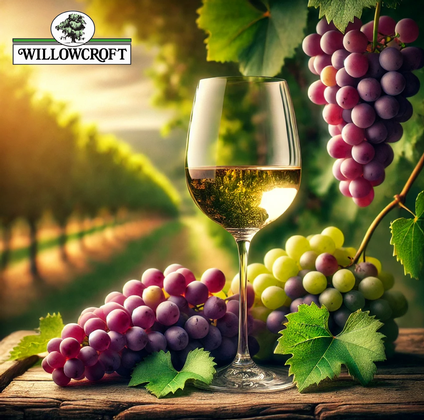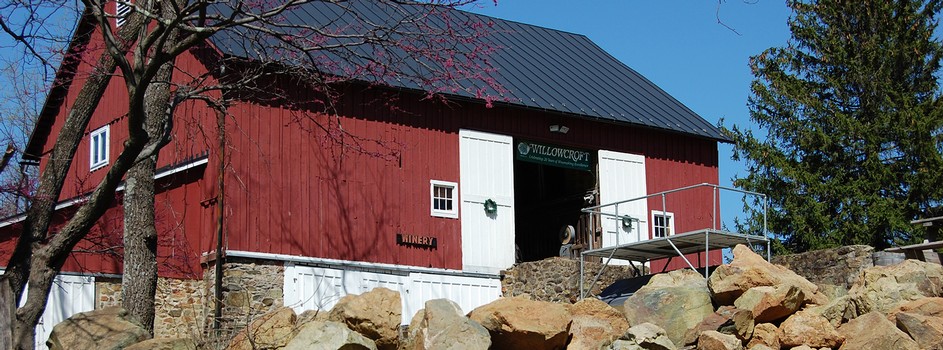Grapes Are the GOAT for Winemaking: Here’s Why!
 When crafting the perfect wine, no fruit does it better than grapes. They are the true GOAT (Greatest of All Time) in winemaking. While it’s possible to make wine from fruits like blueberries, apples, peaches, or cherries, grapes—especially Vitis vinifera—are uniquely equipped by nature to create balanced, complex, and truly magical wines. Here’s why grapes outshine the rest: winemakers have relied on them for thousands of years.
When crafting the perfect wine, no fruit does it better than grapes. They are the true GOAT (Greatest of All Time) in winemaking. While it’s possible to make wine from fruits like blueberries, apples, peaches, or cherries, grapes—especially Vitis vinifera—are uniquely equipped by nature to create balanced, complex, and truly magical wines. Here’s why grapes outshine the rest: winemakers have relied on them for thousands of years.
The Perfect Balance: Sugar, Acidity, and Tannins
Grapes are the ultimate multitaskers when it comes to winemaking because they naturally contain the perfect trifecta:
- Sugar: Fully ripe vinifera grapes boast just the right amount of sugar (20-30%) for yeast to convert into alcohol during fermentation. Other fruits often require additional sugar (a process called chaptalization) to achieve the same results.
- Acidity: Grapes have just enough acidity to balance out their sweetness, giving wines a structured and refreshing flavor. Acidity also acts as a natural preservative, ensuring the wine ages gracefully.
- Tannins: Found in grape skins and seeds, tannins provide the backbone of wine’s structure and contribute to its ability to age. Most other fruits, like apples or blueberries, lack significant tannin levels, resulting in less complex wines.
With grapes, winemakers can create wines that range from sweet and aromatic to dry and bold—all without having to artificially adjust sugar, acid, or tannins.
Nature Knows Best: Grapes Are Self-Sufficient
Grapes are a winemaker’s dream because they come ready to ferment. The natural yeast found on grape skins initiates the fermentation process, while the fruit provides the nutrients yeast needs to thrive.
In ancient times, winemakers needed little more than ripe grapes and a vessel to let nature work its magic. Crush the grapes, let the yeast ferment the sugars, and voilà—wine. All humans had to do was keep it from turning into vinegar. Few other fruits offer this effortless balance, so grapes have remained the gold standard for winemaking throughout history.
Complexity and Versatility in Every Sip
Grapes can remarkably reflect the terroir (the environment in which they’re grown), creating a diverse range of flavors and styles. Grapes can do everything from bold, tannic reds to crisp, aromatic whites and sparkling wines.
While fruit wines made from apples, blueberries, or peaches can be delicious, they often lean toward sweetness and lack the complexity of grape-based wines. Grapes’ unique balance of sugar, acidity, and tannins allows for layers of flavor and aromas that evolve, giving each bottle its own story.
A History Rooted in the Vine
Vinifera grapes have been the foundation of winemaking for over 8,000 years, originating in the regions around modern-day Georgia and Armenia. Early winemakers quickly realized that grapes were the perfect fruit for creating wine with minimal intervention.
As winemaking techniques evolved, grapes remained central to this ancient art. From the rolling hills of Tuscany to the valleys of Napa, grapes have become synonymous with wine, thanks to their unparalleled ability to produce balanced, complex, and age-worthy vintages.
Why Other Fruits Fall Short
While you can make wine from fruits like apples, blueberries, or cherries, these fruits often require extra help to achieve balance:
- Sugar Boosts: Many fruits don’t contain enough sugar for fermentation, requiring added sugar.
- Acidity Adjustments: Most fruits lack the natural acidity needed for a well-structured wine.
- Tannin Additions: Fruit wines often taste flat or overly sweet without the tannins found in grape skins and seeds.
Even some native North American grapes, like Concord, lack the ideal balance of sugar, acid, and tannins, requiring winemakers to make adjustments to produce high-quality wine.
Preservation and Aging Potential
Grapes are uniquely suited for creating wines that improve over time. Their acidity and tannins act as natural preservatives, allowing wines to develop new flavors and aromas as they age. Most fruit wines, by contrast, are best enjoyed young, as they lack the structure to evolve significantly in the bottle.
The Bottom Line: Grapes Are the GOAT
Grapes are truly the GOAT for winemaking because they provide everything needed to create exceptional wines—sugar for fermentation, acidity for balance, tannins for structure, and the natural yeast and nutrients that make fermentation possible.
So, the next time you raise a glass, toast to the humble grape—the real MVP behind every great bottle of wine. Cheers to nature’s perfect fruit for winemaking!

